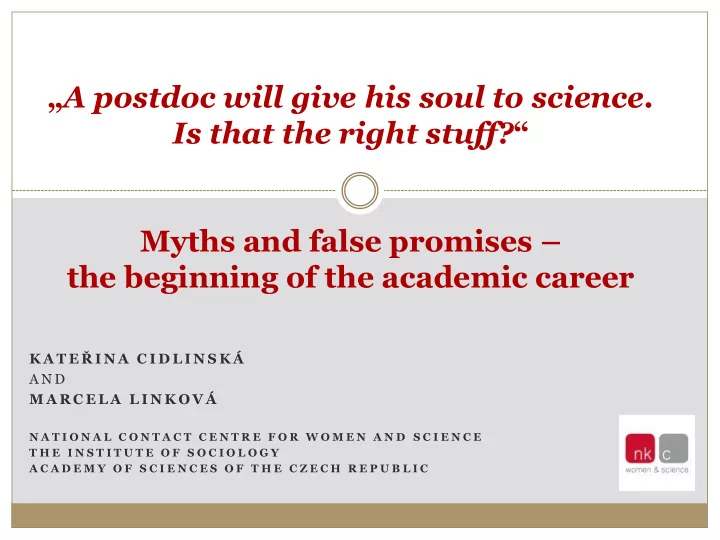

„ A postdoc will give his soul to science. Is that the right stuff? “ Myths and false promises – the beginning of the academic career K A T E Ř I N A C I D L I N S K Á A N D M A R C E L A L I N K O V Á N A T I O N A L C O N T A C T C E N T R E F O R W O M E N A N D S C I E N C E T H E I N S T I T U T E O F S O C I O L O G Y A C A D E M Y O F S C I E N C E S O F T H E C Z E C H R E P U B L I C
Research study design Research questions Data sources Data sources Main research questions: KNOWING project, 2006-2008 What are the career plans of early career Academic couples project, researchers? 2010-2011 Scientists in motion, 2011-2012 Which factors and values influence early career researchers’ plans for their future in Target group: science? PhD students and postdocs from the natural sciences Our sample: Focus of our analysis: 34 in-depth interviews, 1 focus group (17 women, 17 Aspects of professional authenticity men) Work-life balance Focus of the presentation: Myths about academic career development Individual X structural level
Research context - time is changing, the traditional ethos remains Normative scientific career = linear and progressive Economy of promise Scientific profession as a vocation But… Current changes in the academic environment New organization of research work and careers Traditional dynastic dynamic laboratories (Linkova, Cervinkova 2013) limited upward mobility but high job security (bounded career, career mystique) more opportunities for upward mobility but greater job precarity (economy of promise) disappearance of stable research staff Economy of promise fails on the structural level → schizophrenia – Orwellian double-think
Findings I. Influence of normative Preferences notions Early-career researchers are critical of the normalized (rigid) academic path Internalization of normative the dominant notions of success in science notions the competitive academic career system prefer mid-rank research positions Comparing themselves to them Refuse “ doing career” X prefer “ doing science ” Only 3 men in our sample want to reach a top leadership position Normalization of exit Independence / freedom attrition = ever present option Problem: bureaucracy and politicking, need to do “sexy topics” The economy of promise failed even on the science as a profession , individual level not a vocation “giving one’s soul to science” is loosing the sense
Findings II. Planning an academic career + potential attrition - are strongly gendered Men without children – career imaginaries follow a linear professional path family enters their career plans just at the moment when it becomes topical But family is not seen as a barrier to their scientific career Women family (both real and potential) = automatic part of career planning Family seen as a barrier to a scientific career The conditions of the scientific professions seen incompatible with (proper) motherhood preference of mid-rank positions more than men think about leaving the science For women the economy of promise fails even more strongly
Discussion The linear progressive career in science and the notion of a science as a vocation seem to be more myth than reality. What sense does it make to keep the myths alive? Myths always serve something/someone…
So... I. What purposes the maintenance of the normative vision of a linear, upward career progress and science as a vocation serves? Exploitation of early-stages researchers Strengthening the position of well-established senior researchers who followed this kind of a career but in different conditions Different conditions are not reflected in demands on early-stages researchers Who are these well-established senior researchers in policy-making positions? Men. What kind of men? • Those who perform science as a vocation because they could/can afford it What is the result? • The rules they (re)produce reflect only this career model. They do not see the problem because they have not been faced with it.
So... II. For whom is science and who will remain in the system? Who can be fit these criteria? Those who perform one type of masculinity: highly competitive, with sharp elbows and a clear notion of career progression scientific habitus is exclusively male Well established senior researchers and their young clones (young men) Who tends to be excluded by such imaginaries? Men who do not perform the competitive aggressive masculinity Most women Normative (masculine) notions of scientists and the scientific career X feminine gender Right men X right woman → bigger difficulty to perform double-think → showing the desire to stay in mid-rank positions inside teams These positions are disappearing → what future in science can women with these imaginaries have? Another myth broken: science as a gender neutral meritocracy based system
So… III. What does this mean in terms of the future of gender equality in research? The same as in all others prestigious male-dominated fields The need to start working on changing the normative values and notions What are the implications for the future orientation of science? Masculinity does not equal scientific quality… We do not agree with our respondents that if all people like them leave science, science will not suffer any loss Where to start a change? To admit that the core of the problem is not on the individual level but on the structural level. Rendering invisible (or underestimating) structural influences is just a burying one's head in the sand and shifting responsibility from institutions to those in the weakest positions (early-stage researchers, especially women)
Thank you for your attention ¨ Kateřina Cidlinská katerina.cidlinska@soc.cas.cz & Marcela Linková marcela.linkova@soc.cas.cz http://www.zenyaveda.cz
Recommend
More recommend